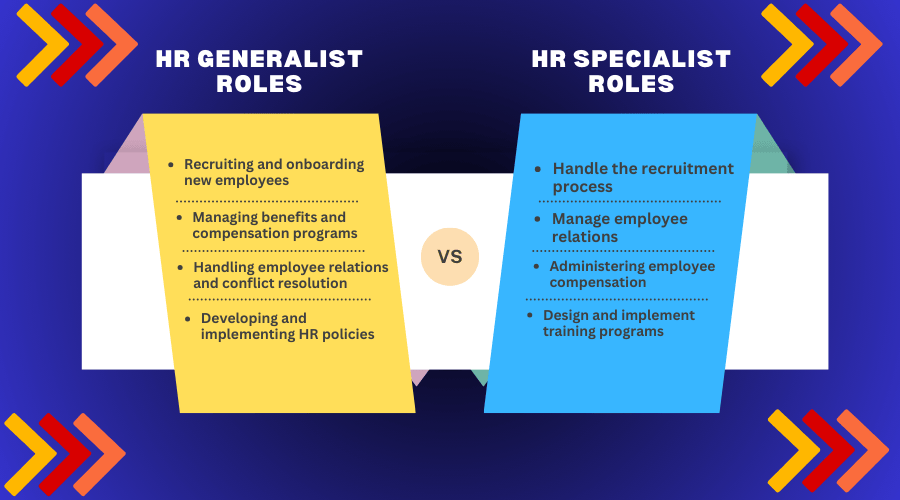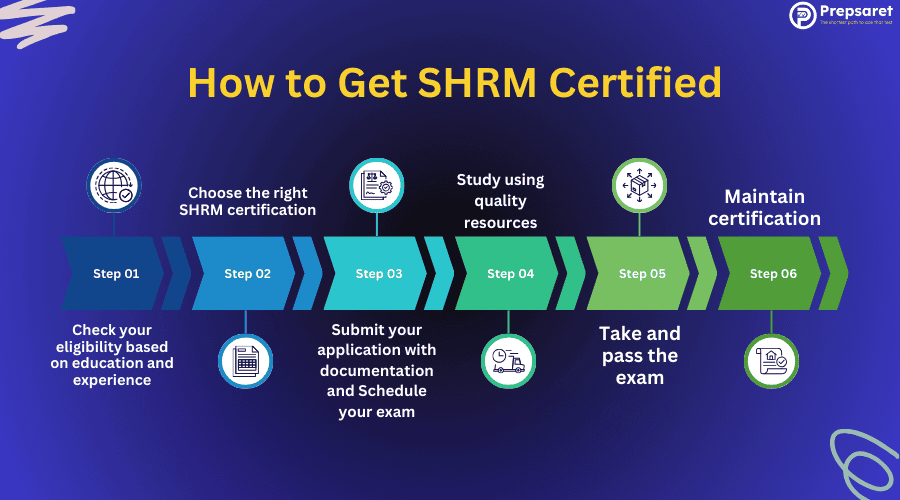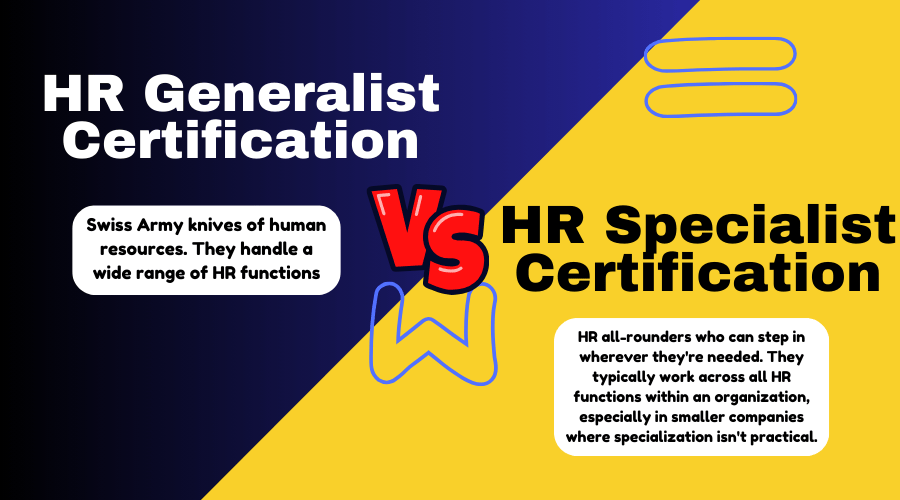Choosing between HR Generalist and HR Specialist certifications can shape your entire career path. Are you better suited to know a little about everything in human resources, or would you thrive as an expert in one specific HR area? This choice affects not just your daily work, but also your salary potential and long-term growth opportunities.
If you’re preparing for any HR certification, Prepsaret offers high-quality study materials, including practice exams and detailed study notes for all SHRM and HRCI exams. Get started with Prepsaret today to fast-track your HR career.
HR Generalist vs. HR Specialist – What’s the Difference?

Before diving into certifications, let’s clarify what these two career paths actually involve. Understanding the fundamental differences will help you make a smarter choice about which certification to pursue.
Roles and Responsibilities
HR Generalists are the Swiss Army knives of human resources. They handle a wide range of HR functions, including:
- Recruiting and onboarding new employees
- Managing benefits and compensation programs
- Handling employee relations and conflict resolution
- Ensuring compliance with labor laws and regulations
- Developing and implementing HR policies
- Coordinating training and development initiatives
Think of HR Generalists as HR all-rounders who can step in wherever they’re needed. They typically work across all HR functions within an organization, especially in smaller companies where specialization isn’t practical.
HR Specialists, on the other hand, focus deeply on one specific HR function. They become experts in areas like:
- Talent acquisition and recruitment
- Benefits and compensation
- Learning and development
- Employee relations
- HR compliance
- HRIS (Human Resources Information Systems)
- Payroll management
Specialists develop deep knowledge in their chosen area rather than broad knowledge across multiple functions. They typically work in larger organizations where HR departments are divided into specialized teams.
HR Generalist vs HR Officer / HR Assistant / HR Manager
Understanding how generalists fit into the broader HR hierarchy helps clarify career progression:
- HR Generalist vs HR Assistant: Assistants usually handle administrative tasks and support higher-level HR staff, while generalists handle professional-level HR functions independently. The assistant role is often an entry point, while the generalist role requires more experience and knowledge.
- HR Generalist vs HR Officer: These titles are sometimes used interchangeably, but generally, an HR officer may have more specialized duties or authority in certain areas compared to a generalist’s broader role.
- HR Generalist vs HR Manager: Managers typically supervise a team of HR professionals (including generalists) and focus more on strategy and leadership. Generalists handle day-to-day HR operations but usually don’t have supervisory responsibilities.
Related post: HRCI vs SHRM
HR Generalist vs. HR Specialist Certification
Certifications reflect the different focus areas of generalist and specialist roles. Choosing the right certification can validate your skills and boost your career prospects in your preferred path.
Certification Focus
Generalist certifications cover the entire HR spectrum, providing a broad foundation of knowledge across all HR functions. These certifications ensure you understand how different HR areas connect and influence each other. Examples include:
- SHRM-CP (Society for Human Resource Management Certified Professional)
- PHR (Professional in Human Resources)
- SPHR (Senior Professional in Human Resources)
Specialist certifications dive deep into one specific area of HR, providing focused expertise. These certifications demonstrate mastery of a particular function rather than general knowledge. Examples include:
- CCP (Certified Compensation Professional)
- SHRM-SCP (Society for Human Resource Management Senior Certified Professional)
- CEBS (Certified Employee Benefit Specialist)
- CIR (Certified Internet Recruiter)
- GPHR (Global Professional in Human Resources)
HR Certifications Comparison

Let’s compare some professional HR Certifications to see which align better with generalist or specialist paths:
- SHRM-CP: Primarily generalist-focused, covering all HR functional areas with an emphasis on operational/tactical aspects. Ideal for HR professionals in roles that implement policies rather than develop them.
- aPHR: An entry-level generalist certification that validates foundational knowledge across HR functions. Perfect for those just starting their HR career.
- PHR: A mid-level generalist certification focusing on operational HR knowledge and federal regulations. Well-suited for experienced HR professionals who implement rather than create policy.
- SPHR: While still covering all HR areas, this senior-level certification emphasizes strategic and policy-making aspects, making it somewhat of a bridge between generalist and leadership specialist roles.
Human resources certification programs are available through various providers, including SHRM (Society for Human Resource Management) and HRCI (HR Certification Institute), with each offering different levels and specializations to match your career stage and goals.
Related post: What are HRCI Certifications?
HR Generalist vs. Specialist Salary Differences
Let’s look at how your certification choice might impact your earning potential in HR roles.
HR Generalist vs. HR Specialist Salary
Nationally, HR specialists tend to earn slightly more than generalists, especially in specialized fields like compensation and benefits or talent acquisition. According to recent data:
- HR Generalists average $65,000-$75,000 annually
- HR Specialists average $70,000-$85,000 annually, depending on specialization
In higher-cost markets like California, the HR generalist vs HR specialist certification California salary difference becomes even more pronounced:
- California HR Generalists: $75,000-$90,000
- California HR Specialists: $85,000-$105,000
The entry-level salary gap is smaller, but widens with experience:
- Entry-level Generalists: $45,000-$55,000
- Entry-level Specialists: $50,000-$60,000
- Mid-career Generalists: $70,000-$85,000
- Mid-career Specialists: $80,000-$100,000
HR Generalist vs HR Specialist Certification Salary
Certification significantly boosts earning potential for both paths. The HR specialist vs HR generalist salary difference often grows after certification:
- Professionals with HR Generalist certification earn 10-15% more than non-certified peers
- Professionals with HR specialist certification earn 15-20% more than non-certified peers
For example, the HR generalist vs HR specialist certification salary comparison shows:
- Certified HR Generalist (PHR/SHRM-CP): $75,000-$85,000
- Certified HR Specialist (specialized certification): $85,000-$100,000
The ROI for certification is compelling for both paths, with most professionals recouping certification costs within 1-2 years through salary increases.
Related article: How Much Does it Cost to Get SHRM Certified?
Entry-Level HR Certification: Generalist or Specialist?
For those just starting their HR careers, choosing between generalist and specialist paths requires careful consideration of your long-term goals.
Most HR professionals recommend beginning with a generalist certification to build a solid foundation. The aPHR (Associate Professional in Human Resources) is specifically designed as an entry-level HR certification for generalist or specialist aspirants.
Other good entry-level options include:
- SHRM-CP (with minimal experience requirements)
- PHR (requires some experience but is attainable early in your career)
For those transitioning from administrative roles into HR, the pathway often involves:
- Starting as an HR Assistant
- Obtaining an entry-level certification like aPHR
- Moving into an HR Coordinator or junior HR Generalist certification role
- Further specializing based on discovered interests and strengths
Remember that your first certification won’t lock you into a permanent path – many successful HR leaders started as generalists before specializing, or vice versa.
Which HR Certification Is Best for Career Growth?

When considering long-term career growth, both paths offer advantages, but they lead to different opportunities.
Generalist track advantages:
- Broader career options across industries and company sizes
- Clearer path to HR management and leadership roles
- Greater flexibility to move between different HR functions
- Better suited for smaller companies where versatility is valued
Specialist track advantages:
- Typically higher compensation potential in niche areas
- Increased demand for specialized expertise in large organizations
- Opportunity to become a recognized subject matter expert
- Potential to move into consultancy roles
HR Career Paths from both tracks can lead to leadership positions, but through different routes:
- Generalists often progress to HR Manager → HR Director → CHRO (Chief Human Resources Officer)
- Specialists might become Functional Lead → Head of Specialty → VP of Specialty Area → CHRO
Both paths can lead to the C-suite, but generalists may have more straightforward progression while specialists may need to broaden their knowledge at senior levels.
Related post: Top HR Jobs You Can Get with SHRM Certification
How Prepsaret Can Help You Prepare for HR Certification
Whichever certification path you choose, proper preparation is key to success. Prepsaret offers comprehensive resources for major professional HR certifications:
- Practice exams for SHRM-CP, SHRM-SCP, GPHR, PHR, and SPHR with detailed answer explanations. These include explanations of why incorrect options are wrong, helping you understand concepts more thoroughly.
- Concise study notes covering all exam content areas. At the end of each lesson, there are 5 practice quizzes with answers to reinforce your learning.
Why Prepsaret is Trusted by HR Professionals
- Current and relevant content: All materials are regularly updated to align with the latest exam blueprints and HR best practices.
- Comprehensive coverage: Materials address all knowledge domains tested on certification exams.
- Affordable pricing: Options for every budget, including free resources for beginners testing the waters.
- Practical approach: Content focuses on real-world application, not just theoretical knowledge.
HR Generalist vs HR Specialist Job Outlook and Opportunities
Understanding future trends can help you make a more strategic certification choice.
The HR field is evolving rapidly, with several key trends emerging:
- Growing demand for data-savvy HR professionals in both generalist and specialist roles. Certifications that emphasize people analytics are gaining value.
- Increasing specialization in large enterprises but continued demand for versatile generalists in small to mid-sized businesses.
- Hybrid roles emerging that combine generalist knowledge with one area of deeper expertise.
- Remote work expertise becoming valued across both generalist and specialist tracks.
The global hiring landscape shows:
- Multinational companies typically seeking specialists for headquarters and generalists for satellite offices
- Tech companies increasingly valuing HR specialists in talent acquisition and total rewards
- Healthcare and manufacturing industries maintaining strong demand for HR generalists with compliance expertise
- Consulting firms preferring specialists who can advise clients on specific HR challenges
The HR Specialist job description continues to evolve, with new specialties emerging in areas like remote workforce management, HR technology implementation, and employee experience design.
Related post: Careers for SHRM Certified Professionals
How To Become a Certified HR Specialist

Becoming a certified HR specialist is a valuable step toward building your HR career and gaining industry recognition. Follow these steps to get started:
- Choose the Right Certification
- For beginners: aPHR (Associate Professional in Human Resources)
- For mid-level professionals: PHR (Professional in Human Resources)
- For senior-level professionals: SPHR, SHRM-CP, or SHRM-SCP
- Check Eligibility Requirements: Each certification has specific criteria based on your education and HR experience. Make sure you meet the prerequisites before applying.
- Register for the Exam: Apply through the certifying body—either HRCI or SHRM—and schedule your exam.
- Prepare Effectively: Study using reliable materials like practice tests, study guides, and flashcards. Prepsaret offers top-quality HR certification prep tools for SHRM and HRCI exams.
- Take and Pass the Exam: Complete your exam at an approved testing center or online. Once you pass, you’ll receive your official certification.
- Maintain Your Certification: Most certifications require recertification every three years, so stay updated with continuing education and professional development.
FAQs
Which Certification Is the Best for HR?
It depends on your career goals. SHRM-CP or PHR are excellent for generalists, while specialized certifications like CCP (compensation) or SHRM-SCP (strategic leadership) suit those wanting to focus on specific areas.
What Is the Next Level After Getting HR Generalist Certification?
Typical advancement paths include HR Business Partner, HR Manager, or transitioning to a specialist role. Many generalists also move into HR project management or operations leadership as they gain experience.
Do You Have To Be Certified To Be an HR Generalist?
Certification isn't always required but increasingly preferred by employers. Certified HR generalists typically earn higher salaries and advance more quickly than non-certified peers with similar experience levels.
How Much Do HR Generalists Make Compared to HR Managers?
HR Managers typically earn 30-40% more than generalists, with national averages around $90,000-$110,000 compared to generalists' $65,000-$75,000. The gap widens at senior levels in larger organizations.
What Is the Difference Between HR Generalist and HR Consultant?
HR Generalists are employees who manage internal HR functions. HR Consultants are external advisors who work with multiple clients, often focusing on specific projects or problems rather than day-to-day operations.
What Is the Lowest HR Position?
HR Assistant or HR Coordinator are typically entry-level positions. These best certifications for HR Generalist roles involve administrative support, basic employee inquiries, and assisting higher-level HR staff with various projects and processes.
What Is the Highest Salary in HR Generalist?
Senior HR Generalists at large corporations can earn $90,000-$120,000, especially in high-cost markets. Those with specialized industry knowledge (like tech or healthcare) often command premium compensation packages.
Start Your HR Certification Journey Today!
Whether you choose the HR Generalist or HR Specialist path, certification will elevate your credentials and career prospects. Your ideal path depends on whether you prefer variety or deep expertise in your daily work.
Ready to take your HR career to the next level? Prepare with Prepsaret’s expert-designed materials and practice tests to build confidence and pass your HR exam. Choose your certification path today and take the first step toward a rewarding HR career in either the generalist or specialist track!

